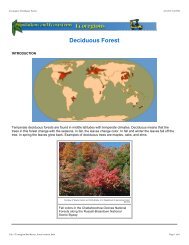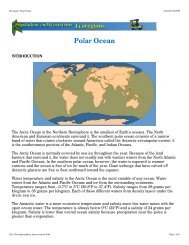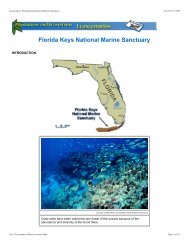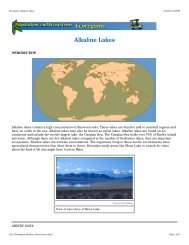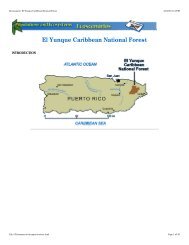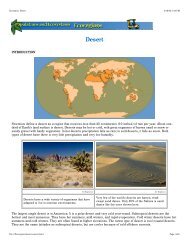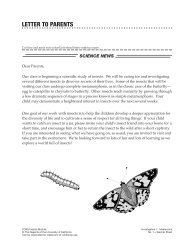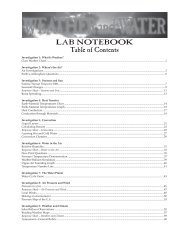Ecoscenarios Combined - FOSSweb
Ecoscenarios Combined - FOSSweb
Ecoscenarios Combined - FOSSweb
Create successful ePaper yourself
Turn your PDF publications into a flip-book with our unique Google optimized e-Paper software.
Ecoscenario: Everglades National Park<br />
4/16/03 3:15 PM<br />
and healthier soil."<br />
http://www.scgc.org/commitment_to_the_environment.htm<br />
People who support stopping water diversion in southern Flroida<br />
Shirley Beccue, National Park Service<br />
"Today it is not enough to merely appreciate nature, we have to actively work to protect it. What we do today toward<br />
that goal is the legacy we leave our children and their children. The extinction of a species is forever...and the<br />
decision is ours."<br />
http://www.nps.gov/ever/eco/danger.htm<br />
Visitor to Everglades National Park<br />
"I remember seeing a lot more birds and wildlife when my family vacationed here in the 1950s. But not as many<br />
people lived here then. Cities use up a lot of the water that used to come here."<br />
Nicole T. Carter, CRS Report to Congress, South Florida Ecosystem Restoration and the Comprehensive<br />
Everglades Restoration Plan<br />
"The Everglades are also affected by degraded water quality. Pollutants from urban areas and agricultural runoff,<br />
including excess nutrients (such as phosphorus and nitrogen), metals, and pesticides, have negatively affected<br />
plant and animal populations. Nutrients entering the Everglades have caused a decline in native vegetation and an<br />
overabundance of invasive exotic species. Changes in the quantity, quality, and timing of freshwater flows have also<br />
disrupted the equilibrium of coastal estuaries and reef systems. Pressure on the South Florida ecosystem is<br />
anticipated to worsen if South Florida's current population doubles as forecasted to 12 million inhabitants in 2050."<br />
http://www.cnie.org/nle/crsreports/biodiversity/biodv-38.cfm<br />
Environmentalist in southern Florida<br />
"The government has a plan for restoring the Everglades ecosystem, but it does not go far enough. There is still too<br />
much water being diverted. It takes care of the cities first and the Eveglades gets the water that is leftover."<br />
Nicole T. Carter, CRS Report to Congress, South Florida Ecosystem Restoration and the Comprehensive<br />
Everglades Restoration Plan<br />
"Some environmental groups question the extent to which CERP contributes to Everglades restoration and whether<br />
so complicated and costly a plan is necessary. There is also concern that the Plan does not include enough<br />
measures to improve water quality in the Everglades. Some groups and federal agencies have expressed concern<br />
that CERP does not explicitly give natural systems precedence in water allocation, and that it is focused first on<br />
water supply rather than ecological restoration."<br />
http://www.cnie.org/nle/crsreports/biodiversity/biodv-38.cfm<br />
Southwest Florida, Water Management District, Seawater Desalination Right Now for the Right Reasons<br />
"Seawater desalination also has consistently been among the most popular alternative water sources in area public<br />
opinion surveys. In a 1997 District survey, nearly 50 percent of the respondents chose seawater desalination as<br />
their preferred alternative water source, higher than all other alternatives. In fact, 87 percent rated seawater<br />
desalination as either a good or very good alternative water source for their homes. A considerable majority of the<br />
respondents, 72 percent, said they were willing to pay $3 or more per month on their water bills to ensure a safe<br />
and sustainable water supply and to protect wetland and lake environments."<br />
http://www.swfwmd.state.fl.us/about/isspapers/desal.html<br />
South Florida Wading Bird Report, Dale E. Gawlik, editor, October 2001<br />
"System-wide patterns this year added to the mountain of evidence that wading birds are extremely sensitive to<br />
changing hydrologic conditions. Nest success differences in Roseate Spoonbills in Florida Bay and switches in<br />
nesting effort and foraging locations among regions of the Everglades are reminders that wading bird monitoring is a<br />
powerful tool for assessing the state of the ecosystem, and therefore the success of restoration<br />
efforts...Unfortunately, 2001 was noteworthy in that there was some nest failure, particularly in Everglades National<br />
Park."<br />
http://www.sfwmd.gov/org/wrp/wrp_evg/projects/wading01/summary.html<br />
Questions<br />
Which side of this debate do you support?<br />
file:///Ecoscenario/everglades/content.html<br />
Page 15 of 17



